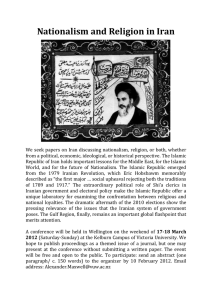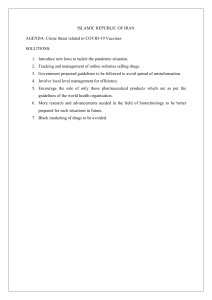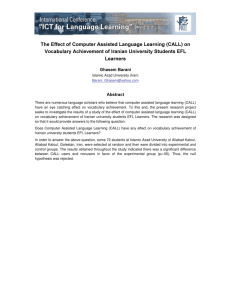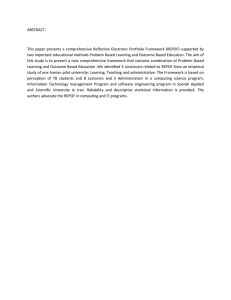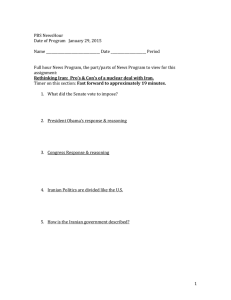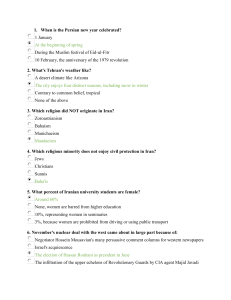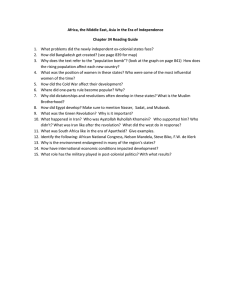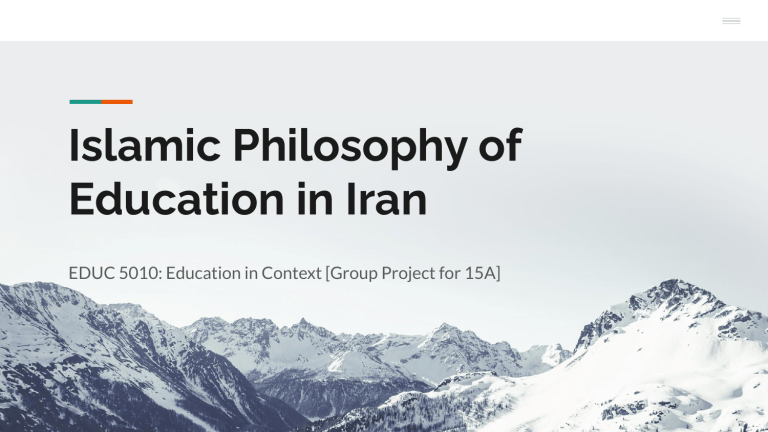
Islamic Philosophy of Education in Iran EDUC 5010: Education in Context [Group Project for 15A] Confidential Customized for Lorem Ipsum LLC TOC EDUC 5010 – Education in Context - Group Assignment, by Bre Scheer and Evon Smith 1. Title Page 2. An introduction 3. Examine a Non-Western philosophical viewpoint: ----a. explain the principles of the philosophy as it applies to education in a chosen country ----b. discuss any great thinkers or philosophers identified with the philosophical viewpoints 4. Discuss the history of education in that country, including some of the social and political forces that have shaped the educational system in recent times. 5. Discuss the social issues that still plague or interfere with the education of all citizens in the country/area. 6. Describe the status of the country’s educational system according to UNESCO, PISA results or other measures of International comparison. 7. Provide solutions to address some of the social issues and recommendations for education reform or progress. 8. A reference page Version 1.0 Introduction Education is vastly influenced by the social, economic, political, and philosophical perspectives from all over the globe. As we develop programs for our young people to grow into successful adults we must determine the necessary priorities and adjust the formatting for creating educational systems that meet the diverse needs of diverse learners. What inquiries should be made as we evaluate the best course of action? What skills and content are necessary for the base foundations with which we start solving global problems? How does the regional characteristics of a place shape the methods and procedures needed for the best results. This presentation will identify the specific characteristics of education in the Islamic Republic of Iran, as they address educational issues within a government and culture founded on Islamic philosophy. Philosophical Viewpoints: Islam and Education 1 2 Integrated faith issues and life values: Education is meritocracy based toward achieving Hayate Tayyebah in every dimension of life (FRDE, 2011). Critical thinking: free will and choice of faith, violence and coercion against religious understanding and philosophy (Rayan, 2012). Logical reasoning. 3 4 Functional purpose: Balance among mind, sense and ethics for the good of human beings, physical education just as important as care of the soul (Rayan, 2012). Responsibilities to self and community: Duty contributes to individual and society and empowers social solidarity and justice (Rayan, 2012). Thinkers and Philosophers 02 | Shirin Ebadi received the Nobel Peace Prize in 2003 for her work to bring about democracy and human rights for women and girls in Iran (The Editors of Encyclopedia Britannica, n.d.). Although she faced exile from Iran, she continues to work for Iranian women and girls. 01 | Ruhollah Khomeini worked to overthrow the Pahlavi regime, bringing the Islamic Revolution to success, and worked as an influential religious leader in educational and political reform in the 1980s (The Editors of Encyclopedia Britannica, n.d.). Shirin Ebadi, 2005. © Victor Boyko/Getty Images Ruhollah Khomeini. “Whenever women protest and ask for their rights, they are silenced with the argument that the laws are justified under Islam. It is an unfounded argument. It is not Islam at fault, but rather the patriarchal culture that uses its own interpretations to justify whatever it wants.” — Shirin Ebadi (https://quotefancy.com/shirin-ebadi-quotes) “I recommend all the officials and authorities to pave the ground for ethical, ideological, scientific and artistic promotion of the youth through all the possible means, and to accompany them until reaching the sublime values and innovations and to preserve the spirit of independence and self-reliance among them.” Sahife-ye-Noor, by the Late Imam Khomeini (May his soul rest in paradise), Volume 21, p.96. Understanding current issues in education Modern Timeline of Islamic Republic of Iran The “White Revolution” Iraq and Iran at War Social and economic Westernization met with much popular opposition After Sadam Hussein announces his intention to reclaim the Shatt al Arab, an 8 year war begins, ending with the help of the UN Security Council 1979 1963 Nuclear sanctions and foreign troubles The last two decades have seen Iran struggle within and without through economic protests and US sanctions 1999 2000s 1980-1988 The Islamic Revolution Student Protests Ayatollah Khomeini returns to Iran and with support declares Iran a theocratic republic guided by Islamic principles Seeking democratic ideals and protesting the totalitarian control of the press Social Issues of Education Islamic Foundations Permeate all Culture Iran is a relatively educated country within its region, with growing literacy and participation in formal schooling since the Islamic Revolution in 1979 (Education in Iran, 2017). When compared with the global average, it is notable that literacy rates for Iranian women are greater (Wolf, 2020.) The modernization and Westernization of Iranian culture since the “White Revolution” and the Pahlavi regime left many Iranians upset and disappointed with the way their national identity was being altered (Wolf, 2020). Since the Islamic Revolution, women have experienced greater opportunities for education (Wolf, 2020). However, human rights for women and girls are not equally protected and in fact, violated by the Islamic Republic of Iran to punish women for individual body autonomy and expression (UN Women, 2022). Nobel Peace Prize winner Shirin Ebadi, now working in exile, was praised by the Nobel committee, "Her principal arena is the struggle for basic human rights, and no society deserves to be labelled civilised unless the rights of women and children are respected. In an era of violence, she has consistently supported non-violence" (Iranian Activist Wins Nobel Peace Prize, 2003, para. 4). The struggle to realize a political system based on the religion of Islam, which has illustrated the ethics for every aspect of Muslim lives, has gained criticism from international agencies and perspectives, as well as men and women in Iran (Education in Iran, 2017). Comparative analysis Increased educational opportunities for women… “‘We are witnessing a younger generation of women who are educated and connected to the world,’ Haleh Esfandiari, an Iranian American and former director of the Wilson Center’s Middle East program” as quoted in a very recent article for the New Yorker by Robin Wright (2022, para. 8). … are resulting in moves of violence toward Iranian women and girls. Reform or improvement in Iranian schools must be diplomatically considered, as the aim must not be to deny Iranians their right to self-determination and religious expression under a just and fair government. With that being said, there are serious allegations of abuse and violence toward protesters young and old, with recent deaths of school children at the hands of Iranian security services since the beginning of this month (Parent & Kelly, 2022). The violence cannot be allowed, and the voices of Iranian girls should be protected by the international community. For the honor of the country, and Islam, the responses to current protests by the Iranian government should be carefully and critically analyzed. This violence does little to promote a positive school environment where children feel secure to learn. Recommendations for reform Modern Protests (Noorani, 2008) Gender Equality In order to meet international goals outlined by the UN, Iran must consider a better balance between its religious goals and it’s participation on a global stage (Monipour, 2021). Iran has increased the opportunities for girls in education since the Islamic Revolution. Currently, the country has a large population of educated and literate women, who are protesting the death of Mahsa Amini, killed by Iranian security council this month. (Wright, 2022). 0 2 References Altinok, Angrist, and Patrinos. (2018). [graph]. Learning outcomes, minimum vs. advanced achievement, 2015. Our World in Data. https://www.ourworldindata.org/quality-of-education Bakhshalizadeh S. & Karimi A. (2019). Islamic Republic of Iran. TIMSS 2019 Encyclopedia. https://timssandpirls.bc.edu/timss2019/encyclopedia/pdf/Islamic%20Rep%20of%20Iran.pdf Clark, N. (2017, February). Education in Iran. WENR. https://wenr.wes.org/2017/02/education-in-iran The Islamic Republic of Iran Ministry of Education. (2011). Fundamental reform document of education (FRDE) in the Islamic Republic of Iran. The Islamic Republic of Iran Ministry of Education. http://en.oerp.ir/sites/en.oerp.ir/files/sandtahavol.pdf Ebadi, Shirin. (2005). [image]. Encyclopædia Britannica. https://www.britannica.com/biography/Shirin-Ebadi#/media/1/928366/118715 Eickelman, D. F. (1978). The Art of Memory: Islamic Education and Its Social Reproduction. Comparative Studies in Society and History, 20(4), 485–516. http://www.jstor.org/stable/178560 Khomeini, Ruhollah. (n.d.). [image]. Encyclopædia Britannica. https://www.britannica.com/biography/Ruhollah-Khomeini#/media/1/316812/220551 References Lee & Lee. (2016). [graph]. Gender ratios for average years of schooling, 1870 to 2010. Our World in Data. https://www.ourworldindata.org/quality-of-education Lee - Lee, Barno - Lee, & UNDP, HDR. (2018). [graph]. Average years of schooling, 2017. Our World in Data. https://www.ourworldindata.org/quality-of-education Moinipour, S. (2021). The Islamic Republic of Iran and children’s right to education: availability & accessibility . Human Rights Education Review, 4(2), 5–25. https://doi.org/10.7577/hrer.3929 Nasiri, S. (2021, March 21). Islamic indoctrination in Iranian schools. Atheist Alliance International. https://www.atheistalliance.org/blog/islamic-indoctrination-in-iranian-schools/ Parent, D. & Kelly, A. (2022, October 18) Iranian schoolgirl ‘beaten to death for refusing to sing’ pro-regime anthem. The Guardian. https://www.theguardian.com/global-development/2022/oct/18/iranian-schoolgirl-beaten-to-death-for-refu sing-to-sing-pro-regime-anthem Rayan, S. Dr. (2012). Islamic Philosophy of Education. International Journal of Humanities and Social Science, 2(19), 150-156. http://www.ijhssnet.com/journals/Vol_2_No_19_Special_Issue_October_2012/16.pdf Wright, R. (2022, October 9). Iran’s protests are the first counter-revolution led by women. The New Yorker. https://www.newyorker.com/news/daily-comment/irans-protests-are-the-first-counterrevolution-led-by-wo men Thank you.
